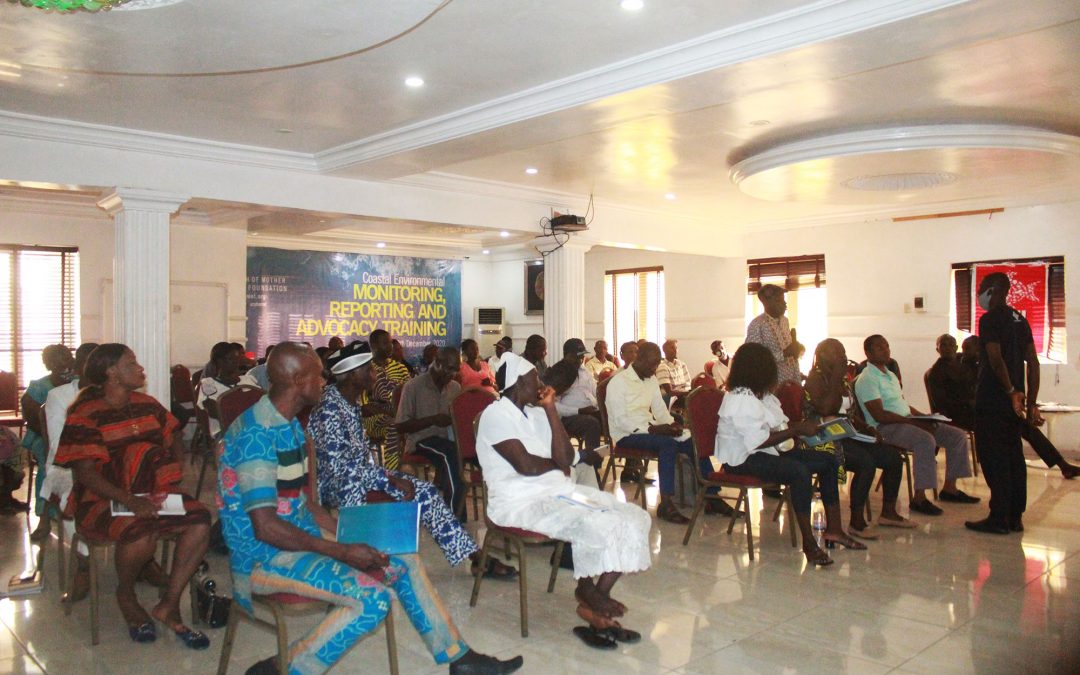Bayelsa is among states with well-defined coastlines and sandy beaches. It is home of foraging and nesting for several species of fish, mammals and other animals. The marine freshwater ecosystems are threatened basically as a result of extractive activities.
Health of Mother Earth Foundation (HOMEF) organised one-day training for fishers in Bayelsa state on Thursday, 10 December, 2020. This training aimed at building and strengthening the grassroots fishers to monitor, report and advocate for healthy marine environment and to ensure their participation in formation of policies concerning aquatic environments. Participants were drawn from fishing communities around Yenagoa as well from Southern Ijaw, Ekeremor and Brass LGAs. Also present were CSOs and the media.
In February 2020, an enormous number of dead fish washed up on an extensive stretch of the Niger Delta coastline. This news first broke out when community people from Ogbulagha Kingdom in Burutu LGA of Delta State raised an alarm over the massive death of fish, floating and littering their shores. Reports also came in from fishing communities in Ondo, Bayelsa, Rivers and Akwa Ibom States. It is, however, worrisome that the actual cause of the incident has not been found till date. Just as the community people were grappling with the massive die-off of fish believed to be caused by pollution from oil and gas related activities, COVID-19 came and obstructed their path to recovery.
Nnimmo Bassey, Director of HOMEF, emphasised the need to train fishers to monitor and report changes in their environment and for fishers to be recognised in the policy circle as key stakeholders for aquatic environment management. He expressed serious concerns on how the once cherished mangroves of the Niger Delta have been destroyed by polluting activities of oil and gas multinationals.
An astute environmental justice campaigner and renowned field monitor, Morris Alagoa in the training session stressed that oil pollution degrades their environment and threatens aquatic ecosystems, their health, livelihood and lives. According to him, “because the environment is our life and our survival depends on it, the only sensible option is to take actions aimed at preserving and protecting the environment. This is why we need to effectively monitor our environment with tools that will provide proofs to support evidence-based advocacy.” He informed that “this year alone there have been several oil spills that occurred due to equipment failure from the facilities of oil companies such as Shell, Agip and Aiteo.” According to Mr. Alagoa, “most of the spills happened during COVID-19 lockdown, affecting our rivers and creeks, especially in Odioama, Okpoama,/Iwoama, Baberegbene, Olugbobiri, Ikebiri, Gbaraun, Angiama, Ogboinbiri, etc. in Brass and Southern Ijaw LGAs of Bayelsa State. Apart from the oil spill incident in Ogboinbiri that is still under contention, all other incidences were reported to be caused by equipment failure.”
Mr. Prince Ebi Clifford Enaibo who is the secretary of Nigerian Union of Fishermen and Seafood Dealers; and doubles as vice chairman, National Fishing Association of Nigeria, Bayelsa State chapter, in an interview noted that fishers are faced with both environmental and livelihood challenges. “Fishermen are suffering because there is no fish in the rivers anymore due to oil spills that have become a household name in Bayelsa state” he said.
Henry Raynus Ebiegberi (also known as “the Shoreline Traveller”) who is from Minibie community and is the Youth Affairs Coordinator of the Akassa Development Foundation (ADF) highlighted the challenges faced by community folks and sued for intense monitoring and data gathering during his presentation at the training. Mr. Ebiegberi emphasised that “there are heavy plastics littered around beaches that are causing temperature rise.” He commented that “environmental erosion, oil spills, gas leakages, artisanal refineries, bunkering and presence of illegal fishing trawlers fishing near shore is quite sadly destructive indeed.” A worrisome observation is that “there has been no reliable baseline survey report to authenticate coastal information especially in Bayelsa State” Mr Ebiegberi complained. He saw it as an imperative to have such report to harmonise common actions. He stated that “for fishing to thrive, the marine environment should be thoroughly monitored with the aim of ensuring biological diversities, protecting and conserving the environment so as to support depollution and create for marine lives, a habitual environment.”
The meeting ended with a call to unite fishers and the need for fishers to be part of the FishNet Alliance – a network of fishers engaged in and promoting sustainable fishing in line with ecosystem limits. Fishers were instigated to stand in solidarity against extractive activities in water bodies including rivers, lakes and oceans.
At the end of the training and group session, the fishers resolved that:
1. There should be increased participation of fishers in policy spaces as regards aquatic environment management.
2. Extraction of oil and gas of any kind offshore and onshore must stop and no new fields should be opened.
3. There should be promotion of traditional knowledge of fishing practices including those that would help mitigate climate change impacts.
4. Activities of industrial trawlers along the Atlantic coast of Bayelsa must be duly regulated.





